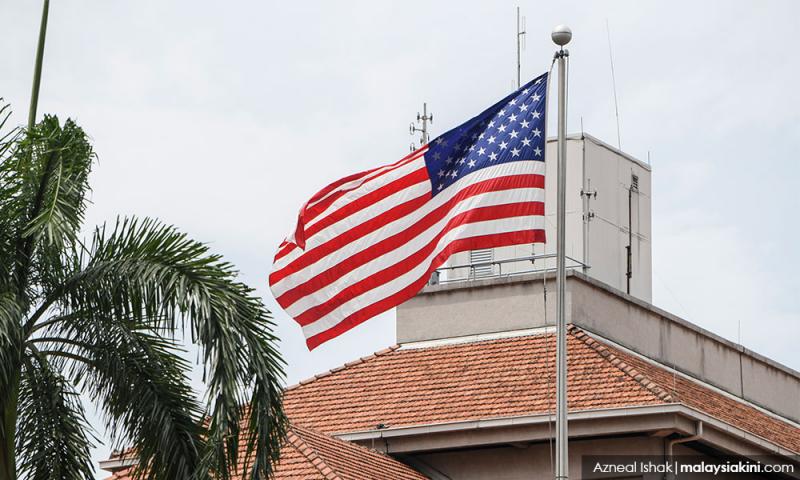
Court orders US Embassy to pay ex-guard RM66k for unfair dismissal
The Malaysian Industrial Court has awarded RM66,000 to a security guard over his unlawful dismissal from the United States Embassy in Kuala Lumpur 15 years ago.
In his ruling delivered on April 27, Industrial Court chairperson Amrik Singh said that the US Embassy failed to provide evidence of misconduct against L Subramaniam.
According to the written ruling, Amrik noted that the US Embassy’s legal team spent a large portion of their submissions stating the Malaysian Industrial court had no jurisdiction to hear the case, rather than providing evidence over Subramaniam’s alleged misconduct linked to unauthorized leave of absence.
Amrik pointed out, however, that the issue of the US Embassy enjoying absolute immunity does not apply here as Subramaniam’s contract of employment from Sept 20, 1998, until his unlawful termination on April 4, 2008, does not involve the handling of confidential information that has an impact on US sovereignty.
The Industrial Court chairperson noted that Subramaniam was never promoted to a higher position that would’ve involved handling confidential information despite being employed at the embassy for nearly 10 years.
Claimant has rights as M’sian citizen
“The Employment Contract itself did not provide a clear indication on the law applicable to the claimant (Subramaniam) and the US Embassy should there be a dispute between them. There was a total disregard to the claimant’s right of appeal when he had written to seek an explanation for his dismissal.
“The claimant cannot be left to ponder which legal system is applicable for him to seek redress for his dismissal when no response was advanced by the US Embassy at the time of his dismissal.
“The additional point here is, of course, the claimant - being a Malaysian citizen - enjoys the rights under the laws of his home country. In this case, no documentary evidence was produced to prove that no claims or proceedings can be brought before the Malaysian courts due to the sovereign immunity of the US Embassy, which in turn entails the claimant to treat the employment contract as commercial in nature,” Amrik said.
The Industrial Court chairperson noted that the US Embassy had made it clear from the onset that it would not participate in the hearing of the merits of Subramaniam’s case, resulting in the US Embassy not providing any evidence of the claimant’s alleged misconduct that formed the basis behind the dismissal.
No evidence of alleged misconduct
Amrik pointed out that the particulars of Subramaniam’s alleged misconduct were not disclosed to him so that he could answer or provide any explanation prior to the termination.
“Additionally, it is important to note that the US Embassy terminated the claimant’s service without issuing him a show-cause letter and without holding a domestic inquiry, in which he would have been given the opportunity to answer to the charges made against him. There were no reasons given to the claimant in writing or in verbal either.
“No evidence was adduced on record on behalf of the US Embassy to rebut the claimant’s claim of unfair dismissal. Without any rebuttal evidence from the US Embassy, it is sufficient for the court to hold that the claimant’s dismissal was without just cause or excuse,” Amrik said.
In calculating the award of RM66,000, the Industrial Court considered Subramaniam’s backwages of RM2,000 times 24 months, as well as compensation in lieu of reinstatement (one-month salary for every completed year of service) of RM2,000 times nine months.
Amrik also ordered the US Embassy to pay the RM66,000 to Subramaniam within 30 days of the date of the award, namely April 27.
When contacted, the claimant’s counsel Ragunath Kesavan confirmed the award.
Subramaniam, 55, who worked with the US Embassy in Kuala Lumpur for more than 10 years, claimed that his service was unfairly terminated in 2008.
He then filed a representation under Section 20 (1) of the Industrial Relations Act 1967, claiming that his dismissal by the embassy was without just cause and excuse, and sought reinstatement to his position as a security guard.
In April 2019, the then human resources minister M Kulasegaran referred the matter to the Industrial Court for adjudication of the dispute.
The US government then filed a judicial review application in the High Court seeking, among others, to quash the then minister’s reference decision and a declaration that it and its embassy were immune from the jurisdiction of the Industrial Court.
The High Court on Jan 8, 2020, ruled that the US government and its embassy were protected by immunity and prohibited the Industrial Court from adjudicating Subramaniam’s unlawful dismissal claim case.
In 2021, the Court of Appeal overturned the High Court’s decision and ordered the Industrial Court to proceed with hearing the dispute, prompting the US government to bring the matter up to the Federal Court.
The Federal Court in June 2022 upheld the ruling of the Court of Appeal.
The Industrial Court hearing of Subramaniam’s claim began in February this year.
The US Embassy was represented by counsel Lim Heng Seng and Summer Chong.
No comments:
Post a Comment